十牛圖 Shiniu tu [Jūgyūzu]
Ten Ox-herding Pictures
Introduction and verse by 廓庵師遠 Kuoan Shiyuan [Kakuan Shien], 12th century
Commentary by 窪田慈雲 Kubota [Akira] Ji'un (1932-)
Translated by J. Cusumano & Satō M.
Paintings by 横尾龍彦 Yokō Tatsuhiko (1928-)
http://homepage2.nifty.com/sanbo_zen/cow_e.html
http://foolszazen.blogspot.com/2011/09/ten-oxherding-pictures-with-kakuan.html
Ten Ox-herding Pictures
Introduction and verse by 廓庵師遠 Kuoan Shiyuan [Kakuan Shien], 12th century
Commentary by 窪田慈雲 Kubota [Akira] Ji'un (1932-)
Translated by J. Cusumano & Satō M.
Paintings by 横尾龍彦 Yokō Tatsuhiko (1928-)
http://homepage2.nifty.com/sanbo_zen/cow_e.html
http://foolszazen.blogspot.com/2011/09/ten-oxherding-pictures-with-kakuan.html
In Japanese
http://homepage2.nifty.com/sanbo_zen/cow.html
In GermanDer Ochs und sein Hirte : Zen-Augenblicke, M�nchen : K�sel, 1990. 152 pp.
[mit Kommentaren und ausgew�hlten Texten von Hugo M. Enomiya-Lassalle ;
mit Tuschzeichnungen von Tatsuhiko Yokoo und Kalligraphien von Yoshiko Yokoo ;
herausgegeben von Bogdan Snela ; deutsche Übersetzung der Texte zu den Zehn Ochsenbildern von Guido Joos].
http://homepage2.nifty.com/sanbo_zen/cow_d.html
(originally printed in Ky�sh� #245 [1994]-#259 [1996]; the present version is a revised edition)
The words in [ ] are the translator's notes; the pictures are works by YOKOO Tatsuhiko (Kuroya 1801-10, Chichibu-shi, 368-0001 Japan).
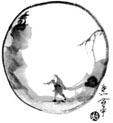 | 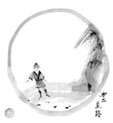 | 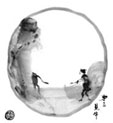 | 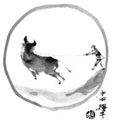 | 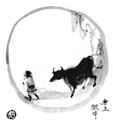 |
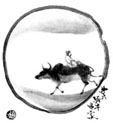 | 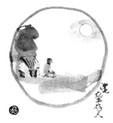 | 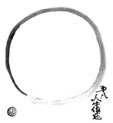 | 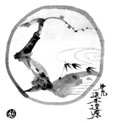 | 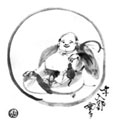 |
Ten Ox-herding Pictures
with the Verses Composed by KAKUAN Zenji
with the Verses Composed by KAKUAN Zenji
Teisho by KUBOTA Ji'un
The "Ten Ox-herding Pictures" are one example of "Ox-herding Pictures." Here, our essential self is compared to an ox. We seek the ox, grasp it, tame it and finally the self which has always been seeking becomes completely one with the ox. But this also is forgotten so that we now simply carry on our ordinary lives. This is the process described by the Pictures. They show concretely the progression of our practice and are very helpful for a self-examination of our own practice and as encouragement for further practice. I hope then that studying the Ten Ox-herding Pictures will provide an opportunity for all of us to continually examine our practice and also give an indication for self-reflection as to what stage we have now arrived.
All that is known about the author of the verses to the Ten Ox-herding Pictures, Master KAKUAN Shion, is that he was a disciple of DAIZUI Genj� [1065-1135], the twelfth in the line of Master Rinzai. His dates of birth and death as well as other information are unclear. To each of the ten pictures of the Ten Ox-herding Pictures Master Kakuan has first put a verse and at the end his disciple, Jion (some say Kakuan himself, others say the friend of Kakuan) is said to have put a general introduction and a brief introduction to each one of the verses.
In the Ten Ox-herding Pictures a little child and an ox are depicted. The ox is the essential self which we are seeking. The little child represents the self of the phenomenal world which wants very much to grasp the essential self - not through concepts and thoughts, but as it really is. This little child (the self of the phenomenal world) is, in fact, always seeking something. It wants money, status, and fame. But life is more than just money, more than just status, and more than just fame. So, the self goes on seeking, now through this philosophy, now through that religion, and endeavors to grow and to make as much progress as possible. There are some who are defeated by the struggle, become neurotic, and even go so far as suicide. For them the spirit of seeking something has operated only as a minus factor; the fact that they are still expending energy and continuing to seek something has not changed.
But why is it that men and women always seek something in this way? According to the teaching of Zen, men and women are essentially perfect and complete, in reality limitless and absolute (this is called "buddha" [hotoke] or "essential buddha-being" [honrai-j�butsu]). Nevertheless, though being such, they appear phenomenally as imperfect, limited, relative, passing sinful beings (sometimes this is called "ordinary people" [bompu], and sometimes "living beings" [shuj�]). Besides, although human being are born this way, they cannot know the essence (Buddha nature) of their own perfection and limitless absoluteness.
The Ten Ox-herding Pictures have concretely depicted the process in which the imperfect, limited, and relative self (the little child) awakens to the perfect, unlimited, and absolute essential self (the ox), grasps it, tames it, forgets it, and completely incorporates it into the personality. But we must stress that these pictures and verses are merely an indication of the way to practice and not an object for conceptual thought. Thus, the study of the Ten Ox-herding Pictures are very useful for those who are actually striving to make clear the true self in Zen through the actual sitting with aching legs. But for those who want only to learn the rationale of Zen I must warn that these pictures and words will be only "white elephants" of no use whatsoever.
Accordingly for the present study I will omit an explanation of the general introduction and proceed to explain the spirit of the particular introduction for each stage. After that I would like to appreciate each line of the verses composed by Master Kakuan himself.
Ten Ox-herding Pictures
Stage 1
SEEKING THE OX
Stage 1
SEEKING THE OX
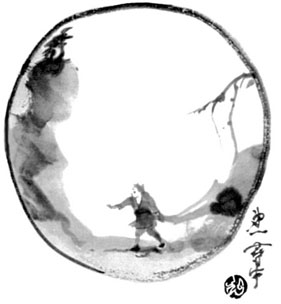
Introduction
Because the Ox has intrinsically never been lost, what need is there to go in pursuit?
Since the herd boy has turned his back on his true-nature,he is far away from it; with the dust before his eyes, he loses sight of the Ox.
Having left his ancestral home far behind, he gradually becomes lost on crisscrossing paths.
Thoughts of loss and gain rise up like flames, ideas of right and wrong spring up like sword points.
Verse
Since the herd boy has turned his back on his true-nature,he is far away from it; with the dust before his eyes, he loses sight of the Ox.
Having left his ancestral home far behind, he gradually becomes lost on crisscrossing paths.
Thoughts of loss and gain rise up like flames, ideas of right and wrong spring up like sword points.
Verse
Incessantly you brush aside thick grasses in pursuit;
The waters are wide, the mountains far, and the path leads on without end.
Sapped of strength, exhausted in spirits, knowing no longer where to search,
You only hear the sound of the evening cicadas chirping in the maple trees.
The waters are wide, the mountains far, and the path leads on without end.
Sapped of strength, exhausted in spirits, knowing no longer where to search,
You only hear the sound of the evening cicadas chirping in the maple trees.
The first of the Ten Ox-herding Pictures is "Seeking the Ox." It is the stage when the desire has arisen to seek the essential self, the original self (the ox). It is known as the "first stirring of the heart" [sho-hosshin] and is indeed a precious and beautiful movement. Although there are billions of people living on this earth, there are only very few who know that the essential self is completely perfect and absolutely limitless. Nor is it an exaggeration to say that there are hardly any who have realized this in fact and made it a part of themselves. How fortunate that we have encountered the authentic and traditional Buddha Way and taken the first step in its practice! How beautiful and precious indeed!
On this earth of ours the first to have realized that our essence is completely perfect and absolutely limitless was Shakyamuni Buddha. So, once you realize it, the completely perfect self (ox) does not go anywhere. Shakyamuni proclaimed that since we are endowed with it from the start there was no need to seek it out. The saying that "all living beings are originally Buddhas" is an expression of this reality.
But how is it with us really? No one has any idea of what way we are completely perfect or how we are absolutely limitless. No matter what, we can only see ourselves as imperfect and insufficient, as relative beings that exist for the limited span of 50 or 80 years. This is because we turn our backs on pursuing the crucial question "What is the true self?" to open our eyes to our real essence, but, instead, go after only the objective world outside us, thus becoming more and more estranged from our true self.
Once we turn to this dust of delusive differentiation, we go from one thing to another pursuing delusions and becoming hopelessly lost in that infinite dust, until finally we have completely lost sight of our true self. A common mistake into which those doing zazen fall is surely this. Therefore, no matter what is seen, no matter what is heard, no matter what comes to mind, not to pay attention to any of it but only become "Mu" itself [cf. Koan "J�shu's Dog" in Mumonkan Case 1]. But rather, thinking Mu is outside of themselves, people try to grasp it conceptually and go after whatever comes to mind, from one thing to the next, without knowing how to stop. Then, Mu (their true self), which is what they should be seeking, goes off somewhere. As a result, no matter how many years pass, they cannot grasp Mu.
And so the familiar mountains and houses of your native place (true self) become distant, and you can no longer know the road over which you originally came. Even if you want to return, you no longer know the way to go back; rather, you go off on a side road which leads in a direction farther and farther away from the true self. What is that side road, you may ask? It is the endlessly critical mind which arises like a sharp dagger, judging some things good and others bad from the criterion of your own profit-gain.
Not being satisfied with the material world and attempting to achieve a solid spiritual base, you have reached the level of "seeking the ox." But if you make a mistake in the method of Zen, immediately you go down a side road with the result that it would have been better not to do zazen at all. Therefore, at the point of beginning zazen it is extremely important to choose an authentic master; at the same time you must never forget to always have a strict spirit of self-reflection when practicing the Way.
Now let's look at the verse of Master Kakuan:
Incessantly you brush aside thick grasses in pursuit.
You make the practice of Mu trying with all your might to overtake the ox by sweeping away the grass of delusive discrimination appearing continually. The legs become painful and the knees ache. In the afternoon you become drowsy. At "kinhin" [i.e., walking meditation between zazen sessions] you loosen the legs, wash the face and take away the drowsiness. You revive your spirit and once again challenge Mu.
The waters are wide, the mountains far,
and the path leads on without end.
No matter how far you go, the channel of the river keeps widening, and the mountain ranges continue far in the distance; you never reach a place where you can say, "Now it is enough." Day after day, there is only sitting facing the wall. Can a person really solve the problems of life by just doing this? Thoughts get confused by the thousands and you go off on an unclear road.
Sapped of strength, exhausted in spirits,
knowing no longer where to search.
Bodily strength is gone as well as mental energy. You don't know what to do. "What can I do? How can I do it?" Only those who have really practiced in a down-to-earth way can understand what it means to reach this point. However, here, at the lowest point, the point of the Great Death, you have reached the very important state that is called "being close to the treasure place."
You only hear the sound of the evening cicadas
chirping in the maple trees.
It is now evening. The cicadas in the maple trees are singing "miiiin, miiiin" in a frenzy. When you hear their cry you want to cry also. "Oh, today also is finishing in vain." Unless you have experienced this kind of thought a number of times, you cannot find your true self.
Ten Ox-herding Pictures
Stage 2
FINDING THE TRACKS
Stage 2
FINDING THE TRACKS
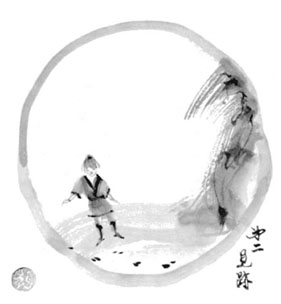
Introduction
He has understood the meaning of the sutras and knows about the tracks through the teachings.
It is clear to him that all vessels are made of gold, and he knows that the myriad things are himself.
But if he cannot distinguish between right and wrong, how can he separate the true from the false?
As he has not yet entered this gate, he can be said to have merely seen the tracks.
It is clear to him that all vessels are made of gold, and he knows that the myriad things are himself.
But if he cannot distinguish between right and wrong, how can he separate the true from the false?
As he has not yet entered this gate, he can be said to have merely seen the tracks.
Verse
At the waters edge, under the trees - hoofmarks are numerous.
Balmy grasses grow abundantly - can you see them or not?
Even if you go deeper and deeper into the mountains,
How could his nostrils, well compassing the heavens, hide him at all?
Balmy grasses grow abundantly - can you see them or not?
Even if you go deeper and deeper into the mountains,
How could his nostrils, well compassing the heavens, hide him at all?
The stage of "finding the tracks" is the stage of having discovered the hoofmarks of the ox. In general, the "hoofmarks" signify the stage in which you read and understand the sutras, or study the various teachings of Shakyamuni and of the patriarchs, and come to a conceptual understanding of the content of their experience. That is to say, it is the stage in which you have understood "cerebrally" the existence of the ox.
However, in actual practice, when you do the practice of Mu with all your might,at first what were two separate entities - yourself and Mu - gradually become one through your efforts and a deepening of Mu practice. And the conviction is born: "if I continue at this rate, I too can certainly make kensho." And then your strength is put into Mu even more. This stage is called that of "finding the tracks."
What does it mean to say that you understand conceptually that the ox exists? It means to have understood the principle that all beings in heaven and earth are empty ("Form is emptiness" - [a famous quote from the Prajna-Paramita Sutra or Hannya Shingy� Sutra]). Once you understand the nature of this emptiness you also understand the principle that all things in heaven and on earth are the self. As Monk J� [who lived in the 4th century China] says: "Heaven and earth and I are of the same root; all things and I are the same body." Now there is an "I" which understands this principle. Yet, insofar as this "I" remains, you do not really understand the true emptiness or the inner state expressed as "Heaven and earth and I are one body."
Thus it is necessary to personally experience the fact of "Form is emptiness." And to do that there is only one way: to give your whole self to Mu, to forget the self so that just Mu remains. If you continue this practice, you will eventually at some opportunity or another take hold of the "fact" that you are completely empty and do not exist anywhere and the "fact" that because you are empty everything is yourself. Insofar as you do not actually do this practice nor have this experience, be assured that your Zen is simply conceptual and theoretical Zen.
Those who are captives to this kind of conceptual and theoretical Zen are also spoken of as a whole as those in the position of "finding the tracks." Those who do scholarly research in Zen, no matter how fine and detailed the research is, from the standpoint of the practice of Zen are taken together as being in the stage of "finding the tracks."
Let's now try to appreciate the verse of Master Kakuan:
At the waters edge, under the trees - hoofmarks are numerous.
Along the water's edge and in the depths of the forest, in every place the hoofmarks of the ox can be seen. Theoretically, "form is emptiness, emptiness is form; heaven and earth and I are of the same root; all things and I are you body." But from the aspect of practice, each and every Mu is every and all the hoofmarks of the ox.
Balmy grasses grow abundantly - can you see them or not?
There are sweet smelling grasses spreading out abundantly and swayed by the wind. The poet challenges us, Can you see them? All things in heaven and on earth, each one by one, are the open and clear and identical expression of this true fact. Do we understand this or not? The verse seems to insinuate that we might comprehend a little with the head, but that we aren't able to truly understand the real thing.
Even if you go deeper and deeper into the mountains.
The more you pursues the original ox with your "Muuuuu," the fartherit goes into the recesses of the mountains. If you look at Mu from the outside and try to pursue it, it just keeps going farther and farther away. This is a very important point: your practice must not be one of pursuing and looking at Mu from the outside. It must be one of just completely becoming Mu itself.
How could his nostrils, well compassing the heavens, hide him at all?
But wait a moment. With each Mu are we not grasping the muzzle of the ox, and is it not the ox (the real self) itself? Is it not a reality that cannot be hidden anywhere? This is a sincere warning for us.
If you are really faithfully practicing, at first you don't know what is what,but gradually the way of folding the legs,holding the hands, and keeping the position become clear; the way of controlling the breath and the practice of Mu itself becomes understood. If you continue for a few months or half a year or a year, gradually the heart becomes calm and the way of doing Zazen itself begins to deepen. And the conviction arises that if you continue this effort, you will without fail attain enlightenment. You begin to sit with greater and greater enthusiasm. Even conceptually you become certain and your conviction of Zen does not waver even with the slightest thing. You have not yet grasped the ox experientially, but you have fully gotten into gear with the practice of Zen. This is the stage of the position of "finding the tracks."
Ten Ox-herding Pictures
Stage 3
CATCHING SIGHT OF THE OX
Stage 3
CATCHING SIGHT OF THE OX
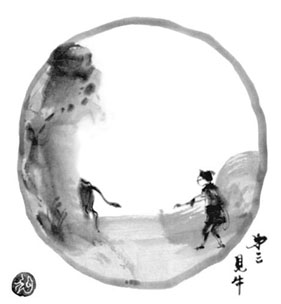
Introduction
If you attain by way of sounds, you will encounter the source of all seeing.
The six sense organs are each no different from this; in all actions, the head is revealed.
It is like the salty taste of the water, the binder in the paint.
Raise your eyebrows, and this is nothing other than THAT itself.
The six sense organs are each no different from this; in all actions, the head is revealed.
It is like the salty taste of the water, the binder in the paint.
Raise your eyebrows, and this is nothing other than THAT itself.
Verse
The bush warbler sings on the branch.
The sun is warm, the breeze gentle, and the willows on the riverbank are green.
There is no place you can escape from him.
That majestic head and horns could never be painted in a picture.
The sun is warm, the breeze gentle, and the willows on the riverbank are green.
There is no place you can escape from him.
That majestic head and horns could never be painted in a picture.
"Catching sight of the ox" is the stage of having seen clearly the real self. What does it mean to see clearly the real self? Up to that time you have been accustomed to think that there was a "substance" (the ego) which was called the self. But to see the real self clearly is to experience the fact that actually the self is completely devoid of substance and that the so-called ego was never even there!
For many this experience is initiated through some kind of resonating sound. Master Mumon [1183-1260, author of the Mumonkan] attained a great enlightenment as soon as he heard the "boom" of a big drum. Master Ky�gen [? -898] was raking in the garden very earnestly when a stone lodged in his broom flew off and struck a bamboo tree with great force. At the sound of the "whack" the delusion that had enveloped him up to that time was blown away at once and he attained the true self. And so there are many examples of such achievements following upon sounds of various kinds.
In this way when you realize the true self, you reach the source, namely, "whatever you see or hear, each individual thing is, just as it is, the true self." Of course, it is important that this be a true experience. If even a little conceptual thought creeps in, it is not a true experience of "catching sight of the ox."
Let's look at this phenomenon more closely. There are said to be six "roots" [kon] of perception, that is, six sense organs: eyes, ears, nose, tongue, (tactile) body, and mind. Corresponding to these organs there are six "objects"[ky�] of perception: color and shape, sound, smell, taste, tangible objects, and mental objects. And there are six "consciousnesses" [shiki] which occur when the six sense organs correspond to the six objects of perception: visual consciousness, auditory consciousness, olfactory consciousness, gustatory consciousness, tactile consciousness, mental consciousness. True enlightenment is understanding that each one of these is true reality, devoid of any substance, the true self; among them there exists absolutely no difference.
And it is not only the six sense organs, six objects of perception, and the six consciousnesses which are meant here. Standing, sitting, crying, laughing, eating, drinking, slipping, spilling - all such movements are the true self, the true fact, that is, the ox as a whole really appearing in total openness.
The condition of the true ox as devoid of all content is just like the saltiness in sea water or the glue in the pigment, which cannot be detected from outside. Ordinary people know only the superficial forms like the sea water or pigment. But after enlightenment you realize that there is saltiness in sea water and glue in pigment, and that, in actuality, these elements have been doing their natural work. When you know clearly saltiness which makes sea water what it actually is and glue which makes out pigment, with confidence you can say that this is the ox (the true self). The result is that the entire way of looking at things you have used up to now changes completely.
Let's now take a look at the verse of Kakuan Zenji:
The bush warbler sings on the branch.
The term "bush warbler" means nightingale. The nightingale sits on a branch and warbles in a loud voice. "Catching sight of the ox" (enlightenment) must be a clear experience like this. It is the "boom" of Master Mumon and the "whack" of Master Ky�gen. Insofar as you bring to dokusan some abstraction like, "Each thing in heaven and on earth is itself an expression of Mu," it is not the real thing. Abstractions, concepts, thoughts are play models of Zen and not Zen itself. Both teachers and students of Zen must take this to heart. Accordingly checking this out is very important.
The sun is warm, the breeze gentle,
and the willows on the riverbank are green.
When you have experienced really "catching sight of the ox" (enlightenment), you for the first time escape from the fetters of the ego and see reality just as it is. It is like when you have put down the pack from your shoulders just as the spring sunlight comes through and a gentle breeze flows; the weeping willows on both banks are putting out green leaves and the branches are swaying gently.
There is no place you can escape from him.
The true ox being expressed in the softness of this spring scene is not just the world which is seen by the eyes or heard by the ear [ninku]. All the environment surrounding us is the true ox itself [hokku]; all the universe is the ox itself. Thus, if this is true, even should you want to escape from the ox there would be no way to escape. And:
That majestic head and horns could never be painted in a picture.
No one can express or diagram or foretell when and in what way the ox will appear, for the movements of the real ox are very lively in the midst of the forest.
But what we must keep in mind here is that, when you have an experience like this, you feel just like you have gotten hold of the neck of the devil, and before you know it, you are boasting of the experience, neglecting your practice, disregarding the master, such that it would have been better never to have done Zen in the first place. "Catching sight of the ox" is still only the third stage. Know that you must walk a road of continual striving for improvement.
Ten Ox-herding Pictures
Stage 4
SEIZING THE OX
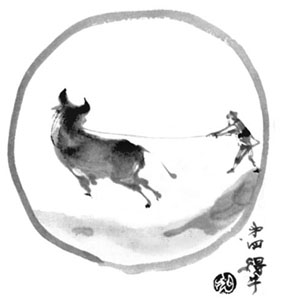
Stage 4
SEIZING THE OX

Introduction
For a long time he has been living in obscurity in the countryside; today you have met him.
Because he enjoys his former situation so much, it is difficult to drive him out.
He cannot stop loving the fragrant grasses; his stubborn will is still strong and a wild spirit remains.
If you wish to make him pure and obedient, you must apply the whip.
Because he enjoys his former situation so much, it is difficult to drive him out.
He cannot stop loving the fragrant grasses; his stubborn will is still strong and a wild spirit remains.
If you wish to make him pure and obedient, you must apply the whip.
Verse
You have exhausted all your faculties to take hold of him.
Because his spirit is strong and his strength abundant, it is difficult to rid him of his habits.
Sometimes he goes to the top of the high plain.
Other times he resides in clouds and smoke.
Because his spirit is strong and his strength abundant, it is difficult to rid him of his habits.
Sometimes he goes to the top of the high plain.
Other times he resides in clouds and smoke.
The stage of "seizing the ox" is that at which you have firmly laid hold of the ox, which is our essential nature. The essence of the ox has become clear. At the stage of "catching sight of the ox, " you have only seen the ox. If you slacken your effort, thinking that this is already the highest attainment, the ox soon disappears from sight again. The resulting state is one in which all that remains is the memory of having seen the ox (having reached enlightenment). Thus, if you have reached enlightenment, it is vitally important to continue your practice more and more vigorously to make that world which has been glimpsed become even clearer.
However, this ox in our heart for a long time has been set deeply in the outlying fields and in the midst of mountains,which is to say, it has been mired in the phenomenal world of dualism. And because it cannot forget the taste of that world, it has been very difficult to pull it away from it. As the result of long years of practice, for a brief moment today, you have been able to grasp the ox. This is the stage of "seizing the ox."
Well, exactly what does it mean to have seized the ox (real self), you may ask. It means to see clearly, without the mediation of concepts, that the essence of your self is completely empty, and that because the essential self is empty it has the unlimited ability to become anything. The expression in the Prajna-Paramita Sutra, "Form is emptiness," refers to this reality; it is neither a thought nor a concept. When you reach this point, there is no fear of losing the "ox" anymore.
However, the world of dualism that you have become accustomed to so long is a very comfortable world in which to live. The true ox that is completely empty of substance, before you are able to come to know it, separates off and becomes the slave of its surroundings. It becomes buried and is unable to free itself. That part of us which is attached to the old world of dualism is not only very stubborn but also has the tendency to soon get out of control. So, in one way or another you cannot help but thinking there is an objective world outside of yourself. If you understand that from the beginning the essence of your self is empty [shinku], you should also be able to see that the objective world is also empty [hokku]. But in reality, things do not go so easily. In order to further make the world of hokku(world as empty) clear you must work and practice harder and harder. Once you have taken hold of ninku (self as empty) and hokku (world as empty), then for the first time the world of truly "seizing the ox" becomes apparent: the whole universes is only one person, so that "above and under heaven there is only I, alone and sublime."
Now we can appreciate the verse of Master Kakuan:
You have exhausted all your faculties to take hold of him.
ecause you found the true ox ("seeing the ox"), you were overjoyed and encouraged a hundredfold. Then, you were further inspired to try to actually grasp the ox with your hands. As a result of this long and persistent pursuit, you were finally able to seize the nostrils of the ox.
Because his spirit is strong and his strength abundant,
it is difficult to rid him of his habits.
But once you grasp this true ox, you find that its habit of seeking the discrimination of dualism remains strong. You put yourself forward everywhere, see the other as other, and are taken up in that world of discrimination. There is danger that those very reins holding the ox, by which you have gone to the trouble to make clear the world of emptiness, will be severed. The bad habit of opposing self and other, because it has perjured over such a long period, does not easily change even though you have understood emptiness. Therefore you must more and more throw yourself into the practice of Zazen.
Sometimes he goes to the top of the high plain.
Let me elucidate that state of not being able to change. At some time, even though it is just for a moment, standing at the pinnacle of "seizing the ox," you linger in the world of emptiness and become attached to the world where - as a famous phrase goes - "there are no living beings to be saved, even if you should want to save them." You boast that "no one has had as deep an enlightenment as I." When your heart is seized by this state, the freedom of mind and action no longer exists. Surely, it is few that have actually experienced such a thorough emptiness, and certainly the joy of having experienced that world is without comparison. But to become attached to that world leads to self-complacency; a person afflicted with Zen sickness like this is nothing but a white elephant that is completely useless for saving other living beings.
Other times he resides in clouds and smoke.
Another facet which is difficult to eradicate is the tendency to return quickly to the world of dualism - the maky� [delusive fantasy] which spreads so easily like a smoke screen. From there it is very hard to escape again. Because the self-consciousness that "I have attained an enlightenment which others couldn't" has become so strong, such a person is, on the contrary, more stubborn than those who have not attained enlightenment. Such people put themselves forward more strongly, and reach a state which is beyond help. Undoubtedly there were some cases like this in the past because there is an ancient term "arrogant Zen-devil" [zen-tenma] to warn against just such a state. To avoid that pitfall, you must, after reaching enlightenment, become more and more humble and put yourself more into Zen practice.
Ten Ox-herding Pictures
Stage 5
TAMING THE OX
Stage 5
TAMING THE OX
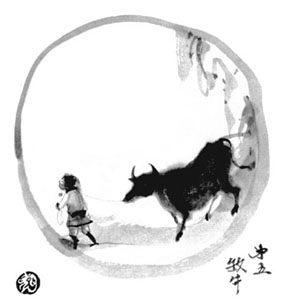
Introduction
Once thoughts rise up even slightly, they are followed by other thoughts.
Through enlightenment, they become true; in delusion, they become false.
It is not due to our surroundings that they are there; they are only produced by our mind.
We must pull the Ox firmly by his tether and not allow any doubts to enter.
Through enlightenment, they become true; in delusion, they become false.
It is not due to our surroundings that they are there; they are only produced by our mind.
We must pull the Ox firmly by his tether and not allow any doubts to enter.
Verse
Whipping does not depart from the body at any moment.
Lest he follow his own whim, entering the dust and dirt.
If you devotedly tame him, he will be pure and gentle.
Without bridle and chains, he will follow you of his own accord.
Lest he follow his own whim, entering the dust and dirt.
If you devotedly tame him, he will be pure and gentle.
Without bridle and chains, he will follow you of his own accord.
Once you have reached the point of "seizing" the ox, which is the true self, you must not rest on your laurels but continue to practice with all your strength and go on to the next stage. It is the stage of taming the ox, a very important process by which you make your own that which has been realized. As I mentioned previously, seizing the ox is grasping clearly the fact that the essence of your self is completely empty [ninku] and at the same time all beings in the universe are also completely empty [hokku]. But to have attained such an enlightenment does not mean that our concepts and delusions automatically all disappear. With the re-appearance of just a minor conceptualization, the delusive concepts come back again one after another without end. In fact, it is the case that the clearer your experience of seizing the ox, the harder it is to escape the delusion of having understood this whole world and to avoid the proud thoughts which ensue one after another. You boast of the experience, talk proudly of Zen, and fall prey to the reckless desire to want to direct and lead others.
Of course, if you should ask what is the essence of these delusive and discriminatory thoughts that arise continually, know that they are in themselves empty and without reality. If you can really rest assured in that fact, each of them, one by one, becomes the true self as it is. But we humans, unfortunately, always cling to what we have experienced and have the habit of not letting go. This is especially true in the case of the seizing of the ox, a feat that most people have a difficult time achieving. Once we have made it, we boast that no one has had such a wonderful experience. We cling to the delusive and proud thoughts that arise one after another, such as, "Perhaps even Shakyamuni Buddha himself did not have such an experience as I." And these thoughts themselves become a new reason for delusion.
We always can see only the oppositional world of dualism, subject and object, but the concept that the objective world "is" appears not because the objective world is really there. Only because in our hearts we recognize "The objective world is," it is. This means that this "is-ness" is, in reality, only in our mind. Therefore, there arises in the mind the idea of "I" which has experienced seizing the ox, so the world corresponding to that "I" also appears, with the result that the objective world is conjured up by the proud "I". In the true world of seizing the ox, the objective world as well as the subjective world is totally empty; there is no room for being and non-being to appear at all. To be always at rest securely in such a world, it is necessary by all means to put the halter through the nose of the ox and pull it firmly. If the ox starts to eat the grass of discriminatory delusion, tell him "No, no!", never neglecting the due training, and continue in hard practice to the end. The practical means to that end is that single sharp spear, MU. This is the practice for post-enlightenment, and you must say that, in a sense, it is endlessly more difficult than the pre-enlightenment practice.
Let's now look at the verse of Master Kakuan:
Occasional whipping does not depart from the body.
The stage of taming the ox is one in which you must make the utmost effort to bring under control as far as possible the ox you have seized. For that purpose you must never let the whip or the halter get away from your self.
Lest he follow his own whim, entering the dust and dirt.
If you don't take such precautions, without fail the ox will go off on its own and will enter that world of discrimination full of dust and dirt. It goes without saying that this applies to the secular world in which it was so much at home before, but it also wants to go into that world of enlightenment (seizing the ox), and it is not easy for it to come out from there again.
If you devotedly tame him, he will be pure and gentle.
To "devotedly tame him" means that if you really become serious and keep taming the ox, your heart gradually softens and becomes pure. This is a very important process. Having your experience approved, and coming to the stage of seizing the ox, an experience which most people have a hard time achieving, you come, by and by, to think greatly of yourself, and without noticing, you become proud of yourself. It is only through strenuous sitting and continual training that the heart gradually becomes gentle, and the physiognomy becomes mellow, and the former harsh way of speaking drops away. If this does not happen, it is not the true effect of Zen.
Without bridle and chains, he will follow you of his own accord.
Once the ox has become tamed, even if you do not attach the bridle or chains, the ox naturally starts to follow. Therefore, standing, sitting, crying, laughing, the true ox always remains.
Ten Ox-herding Pictures
Stage 6
RIDING THE OX HOME
Stage 6
RIDING THE OX HOME
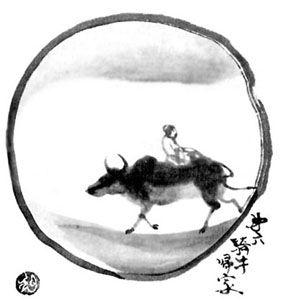
Introduction
The battle is already over, gain and loss are also empty.
He sings a woodcutter's rustic song and whistles a child's tune.
Straddled on the Ox's back, he gazes at the clouds.
Though you call him he will not return; though you try to catch and hold him, he will not stay.
He sings a woodcutter's rustic song and whistles a child's tune.
Straddled on the Ox's back, he gazes at the clouds.
Though you call him he will not return; though you try to catch and hold him, he will not stay.
Verse
You mount the ox and want to make your way slowly home.
A barbarian plays the flute in the red glow of sunset.
Each measure, each tune is filled with ineffable tones.
Among true intimates, what need is there for words?
A barbarian plays the flute in the red glow of sunset.
Each measure, each tune is filled with ineffable tones.
Among true intimates, what need is there for words?
As the title says, this is the stage in which you get on the ox and ride it home. It is the fruit of the previous stage of taming the ox, and it is that stage in which at last the ox follows what it is told.
In the stage of seizing the ox, you were able to grasp your true self. However, as is often said, if thoughts occur even a little, other thoughts are soon to follow; you are then bothered by thoughts which occur one after another. Especially the thought that you have achieved a great enlightenment rarely attained by others, gradually without your noticing it, becomes a source of pride which is difficult to dispel. Therefore, you try to tame this ox by fighting strongly against such a thought, saying to yourself: "This is not enough, this is not enough." Now this effort at taming the ox has brought results, and the struggle is over at last. By that I mean that you have recognized that the substance of unenlightened/enlightened, ordinary/holy, good/bad, gain/loss is empty and that accordingly the wall between unenlightened/enlightened, ordinary/holy, good/bad, gain/loss has disappeared.
And so just as the lumberjack hums a country melody or children innocently play their children's tunes on their flutes, so too does such a person enter a state of true freedom without any blocks. From the standpoint of the ordinary person it is indeed an enviable state. This state in which the ox (your true self) does exactly what it is told,is like being able to lie down leisurely and watch the clouds in the sky move gently here and there.
Even if you try to call the ox back,it does not look back. Even if you try to grab it and to lock it up, it would not stop. Letting things run their course, day by day, hour by hour, doing what should be done, you go along without any hindrances.
This is truly a wonderful state. However, there is here a big trap. That is because there is an ox which is walking along smoothly on its own and a self which is looking at that ox. And that self is happy, gazing at the ox (the true self) and thinking how gentle it has become. Your state has become so comfortable. You proclaim that you have reached a wonderful state. And those who hear that admire it as something worthy. But they also think that such a person must be special, and they feel no urge to try zazen. The result is a completely useless Zen, certified by only your self. But once you have come this far, you must urge yourself on further by the motto, "Practice another 30 years," and sit and sit and polish the self.
Now let's look at Master Kakuan's verse:
You mount the ox and want to make your way slowly home.
The word for "slowly" [iri] in the original text refers to something connected and stretching for some distance. Here you have mounted the ox, which is your true self, and is slowly proceeding to return to your native village with no end yet in sight. "Wanting to make your way" means that you are trying to return, but it also implies that you are not being able to do that. What keeps you from coming back? It is because there is a self, which is looking at the ox.
A barbarian plays the flute in the red glow of sunset.
"A barbarian" [ky�] refers to a foreign tribe living in the northwest of China. The sound of a flute played by someone in this tribe salutes the sunset note by note. It can be heard so clearly. But that flute, like the sound of a foreigner playing in a strange land, brings a tinge of melancholy.
Each measure, each tune is filled with ineffable tones.
That is true, but, in each song and each note, there is an infinite savoring. That is so because in every clap of the hands, or every footstep, or in each blade of grass, the true self is at work. You are able to experience directly these things without logical thinking and manipulation of concepts.
Among true intimates, what need is there for words?
But what really is that like, you may ask. In ancient China there were two friends, Hakuga and Ch�shiki. Hakuga was a master of the Chinese lute. When Hakuga played the lute, Ch�shiki would discern the state of his mind and his disposition by listening carefully to the sound and the tone. So it is not always necessary to verbalize what is within. There is a way of understanding perfectly while being silent.
It is not easy to reach this state. However, this close friend, that is to say, the ox, which without saying or proclaiming anything, is always still there. Because this state is pleasant and happy, the sickness of clinging by all means to this experience appears. This is the innate weakness of human nature. And little by little, unawares, you fall into this way of thinking. This stage is only the sixth stage, and you should know that you are still "on the way."
Ten Ox-herding Pictures
Stage 7
OX FORGOTTEN,
PERSON REMAINING
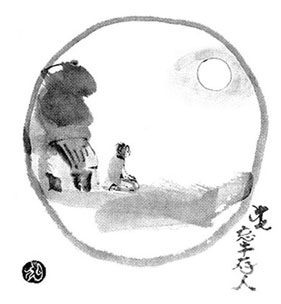
Stage 7
OX FORGOTTEN,
PERSON REMAINING

Introduction
In the dharma there is no duality; the Ox is the foundation.
It may be compared to the rabbit and the snare; it is expressed in the difference between fish and weir.
Like gold coming from ore, like the moon emerging from behind the clouds.
The Single Way of cold light has been shining ever since the time of Ion beyond the kalpas.
It may be compared to the rabbit and the snare; it is expressed in the difference between fish and weir.
Like gold coming from ore, like the moon emerging from behind the clouds.
The Single Way of cold light has been shining ever since the time of Ion beyond the kalpas.
Verse
You have mounted the ox and already reached your home in the mountains.
The ox is gone and the person has nothing more to do.
Though the morning sun has already risen three bamboo lengths, he dreams on.
The whip and the halter, no longer of use, are hung up in the stall.
The ox is gone and the person has nothing more to do.
Though the morning sun has already risen three bamboo lengths, he dreams on.
The whip and the halter, no longer of use, are hung up in the stall.
In the stages of the practice of the Buddhist way we have at last reached the seventh stage, "forgetting the ox." It goes without saying that the ox refers to what may be called the original self or the true self. It is Mu which all of you are looking for. This is the stage of forgetting the ox. But what does it mean to "forget the ox"?
We began our practice by seeking the ox. We discovered the ox (catching sight of the ox), took hold of the ox (seizing the ox), brought the ox under control (taming the ox), and have been training the ox to do, to a certain degree, what it is told (riding the ox home). In this process you have handled many koans, knowing the joy of passing them as well as the pain and anxiety of not getting through them.
When you seek in such a thorough fashion the true self (the ox), that self which is doing the seeking disappears, and only the true self remains. More exactly, you enter the world in which the true self also does not come into consciousness. This is truly that world in which you have forgotten the self completely, a world of complete emptiness, "without even a wisp of cloud to obstruct your vision" [manako ni sayuru kumonohamo nashi].
Were you to compare this world to something concrete, you might think about extracting pure gold from base ore. It is totally pure and without blemish. The whole universe is pure gold. The ore from which you extracted the gold, the tools you used to extract the gold are all gone. Or again, it is just like the moon moving apart from the clouds and shining in the fullness of the heavens completely white. The whole world is a world in which there is only the moon with no clouds at all. The sublimity of a world completely void is beyond verbal expression. It is a world which can only be savored by actual experience.
When you arrive at this point, the koans with which you have struggled and labored become completely useless [kankagu: "unnecessary pieces of furniture"]. However there is always room for greater attainment. At this stage there still remains as a residue [kasu] the self-consciousness that this world is without any substance. That is the aspect of this stage expressed as zainin ("the person remains"). YAMADA K�un Roshi has expressed his own experience in the following way:
"In terms of my own experience, for about a week after my enlightenment it seemed as if my whole body was trembling. And like a fish put in to the water to swim, I was able to live without any hindrance. I felt very free and happy. However, that did not continue long. After about 10 days or a month, the self appeared again. It was not so much the consciousness of the egoistic possessive ego, but rather the consciousness of the self. You are conscious of the self. That remains."
In my case I realized that koans were totally "unnecessary furniture," and for a while I felt that doing koans was completely foolish; as I remember, the self-consciousness that the thinking self was there continued for quite a long time. This is not yet the real thing.
Let's now go on to Master Kakuan's verse:
You have mounted the ox
and already reached your home in the mountains.
In the verse on the sixth Picture ("riding the ox home.") it was said, "You mount the ox and want to make your way slowly home." The words "want to" convey the meaning that you try to go home but can't. And why is that? I said it was because there is still a self which is looking at the ox. When you do away with this self which is doing the looking, you actually understand that you have already reached home. I want you all to really grasp how important it is to have had the experience once of thoroughly forgetting the self.
The ox is gone and the person has nothing more to do.
Both the ox to be sought (the true self) and the seeker also are totally void and empty of content. Once this is understood, the ox and the seeker are totally one. We could say, "When you stop seeking, the whole thing appears." The world in which there is no one and no thing manifests itself clearly and vividly before your eyes. It surely expresses the spirit of "the leisurely person of the Way, who, having finished learning, has nothing more to do" [zetsugaku mui no kand�nin - a quote from the Sh�d�ka].
Though the morning sun has already risen three bamboo lengths,
he dreams on.
Absolutely nothing more to do! Even though the bright red sun climbs in the sky as high as "three bamboo lengths," you are still in dreams and sleeping. This attests to the level of realization at which the entire universe is intrinsically safe and sound.
The whip and the halter, no longer of use, are hung up in the stall.
Accordingly, the whip and halter used to control the ox are not needed any more. They are left alone at a corner of the hut where the grass is growing. Formerly, with a great effort using the whip and binding with the halter you trained the ox. But now that is completely unnecessary. Yet there can be no slackening of effort! There is still that self-consciousness of the self that "no longer needs to train the ox."
Ten Ox-herding Pictures
Stage 8
PERSON AND OX
BOTH FORGOTTEN
Stage 8
PERSON AND OX
BOTH FORGOTTEN
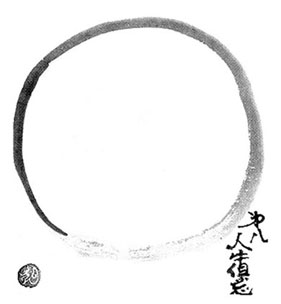
Introduction
Ordinary feelings have fallen away, thoughts of holiness are all empty.
We should not linger where there is Buddha; we should pass quickly by where there is no Buddha.
If we do not stick to either, it will be difficult for a thousand eyes to perceive us.
For myriad birds to carry flowers is a shame all around.
We should not linger where there is Buddha; we should pass quickly by where there is no Buddha.
If we do not stick to either, it will be difficult for a thousand eyes to perceive us.
For myriad birds to carry flowers is a shame all around.
Verse
Whip, tether, person and ox - all are empty.
The blue sky spreads out far and wide, it cannot be communicated.
On a red-hot oven, how can there be any place for snow?
Having come this far, you understand the intention of the patriarchs.
The blue sky spreads out far and wide, it cannot be communicated.
On a red-hot oven, how can there be any place for snow?
Having come this far, you understand the intention of the patriarchs.
At the eighth stage, "person and ox both forgotten"[jingyu gub�], we come to realize the fact that this "I" (person), which has been seeking, and the essential self (ox), which has been the object of our search, did not exist at all.
It is the same fact manifested in D�gen Zenji's statement, "My body and mind have fallen away," which he presented to his own master, TEND� Nyoj� Zenji [1162-1227], after he had come to great realization upon hearing the words of his master, "Practicing Zen is the falling away of body and mind." You have forgotten yourself, you have forgotten all others, you have forgotten everything; there is only one round circle without any substance whatsoever. This is what is meant by "person and ox both forgotten."
In order to reach this stage, it is of crucial importance that - as a saying goes - "you do not linger where there are buddhas, and you pass quickly through where there aren't any buddhas." To "linger where there are buddhas" means to idle your time away with such beloved concepts as "buddhas," "enlightenment," and so on. As long as you cherish in your mind even a little bit of such ideas as "kensh�," "great enlightenment" [daigo tettei], "Dharma transmission" [inka sh�mei], and so forth, you are not yet a true one. "Where there aren't any buddhas" means, on the other hand, a level of mind where you can say that such seemingly precious items concern you no more. But you must never foster this notion in your head or even take pride in this fact. You must "pass quickly through" it.
Explaining the seventh stage "Ox Forgotten, Person Remaining," I mentioned that there still remains self-consciousness. It was because the person was leisurely dwelling on the level of "no buddhas." When you have passed through this level, the world where there is utterly nobody and nothing becomes truly clear and evident.
If you have passed beyond both the world of buddhas and that of no buddhas, you are in a world which even Shakyamuni or Manjusri with their clairvoyance cannot perceive. It's because there is not even a thing there. The basis of Zen is to grasp this world of nothingness through experience. Zen without this experience is merely a conceptual Zen and amounts to nothing more than playing around with plastic models of Zen.
If someone has truly experienced the real fact, how would his life look? Let me show you an example. In ancient China there was a Zen master named GOZU H�yu [594-657]. He was a man of high virtue, and people in his neighborhood respected him deeply. Even birds praised his virtues by fetching flowers and offering them to him. But later on, after he came to great enlightenment under the Fourth Patriarch DAII D�shin Zenji [580-651], the birds stopped bringing flowers to him. As long as people extol you as a great person, a person of high virtue, etc., you are not real. A person of true enlightenment does not look great at all. The birds fail to spot H�yu Zenji, because he turned invisible to them, as he became someone who is nowhere.
Let's now appreciate the verse composed by Kakuan Zenji:
Whip, tether, person and ox - all are empty.
You have diligently applied whips and tethers, searching with all your might for your essential self. Your goal once attained, you realize that the whips, tethers, you yourself and the ox - all is empty with no substance at all. It is a world where there is utterly nothing and no one.
The blue sky spreads out far and wide, it cannot be communicated.
The blue sky is wide and clear. It expresses the true fact of emptiness, the world of true self. Since it is empty, there is no means to communicate it. Yet, to tell you the truth, it was communicated from the very beginning as "empty."
On a red-hot oven, how can there be any place for snow?
The "red-hot oven" is a live blast furnace burning with scarlet flames. It melts away anything. It goes without saying that snow will be made to evaporate in an instant, leaving no trace whatsoever. It means that the true fact of emptiness is burning hot like the furnace. There is no room for any discriminatory thought ("snow") to enter.
Having come this far, you understand the intention of the patriarchs.
Only at this level, you match the spirit of buddhas and patriarchs. In other words, if you don't attain this level, there is no meaning in your Zen practice. Only with this experience can you solve your problem of life-and-death and attain true peace of mind. However, it is still the eighth stage of practice; you need to practice more to come up to even higher levels.
Ten Ox-herding Pictures
Stage 9
RETURNING
TO THE SOURCE
Stage 9
RETURNING
TO THE SOURCE
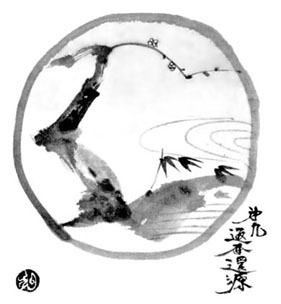
Introduction
It is originally pure and clean without a speck of dust clinging.
He observes the flourishing and dying of form while remaining in the silence of no-action.
This is not the same as illusion; what need is there for striving or planning?
The water is blue and the mountains green; he sits and watches phenomena take form and decay.
He observes the flourishing and dying of form while remaining in the silence of no-action.
This is not the same as illusion; what need is there for striving or planning?
The water is blue and the mountains green; he sits and watches phenomena take form and decay.
Verse
Having come back to the origin and returned to the source, you see that you have expended efforts in vain.
What could be superior to becoming blind and deaf in this very moment?
Inside the hermitage, you do not see what is in front of the hermitage.
The water flows of itself and the flowers are naturally red.
What could be superior to becoming blind and deaf in this very moment?
Inside the hermitage, you do not see what is in front of the hermitage.
The water flows of itself and the flowers are naturally red.
How much time and pain it took to come to the eighth stage of "Person and Ox Both Forgotten"! Now you have reached at last the stage where you realize the fact of "Person is empty, so is the dharma," that is, the subject (person) and the object (dharma) are both totally empty. Since this is the fruit of extremely long and hard labor, you tend to stick to this stage and to cherish it endlessly - the last residue of enlightenment. If you succeed in washing it away by constant and persistent sitting, you come to a state of realization that the fact of "Person is empty, so is the dharma" is the essential state of human beings, signifying nothing special at all. Through this realization you return to your original starting point. This is the stage of "Returning to the source," where not a trace of such things as "Buddhism" or "Tathagata" is found anywhere. It is true that "the state after enlightenment is exactly the same as that of before enlightenment." It is the state of mind of "a leisurely person of the Way, who, having finished learning, has nothing more to do."
At this stage you can observe that all the highs and lows and vacillations of this world are, as they are, void of substance and are manifestations of the world of perfect stillness and non-being. Expressed in these terms it sounds as if there were two things - being and non-being. But in fact, being is non-being; the aspect of being is, as it is, non-being itself. There is no distinction between the two at all.
This proposition "Being is non-being" is a crude fact, not a temporary illusion or a dream. At this point you can realize and affirm that it has been entirely unnecessary to be consciously engaged in practicing the way or trying to attain enlightenment. This is a very important point: you start with the first stage of "Searching the Ox," and, spending many years in practice, you come at last to the ninth level of "Returning to the Source," and as a result of this entire process you can say that practice and enlightenment were unnecessary. It is totally wrong to maintain from the very beginning that practice and enlightenment are of no use. Such an attitude is called "inactive zen" [buji-zen] . Today, almost all Zen schools in Japan have degenerated to this "inactive zen." They maintain that just sitting is enough, not appreciating the experience of enlightenment or even ignoring it. On the other hand, you must bear in mind: No matter how strongly you argue that enlightenment is important, if it's nothing more than just propagating a conceptional zen or if you take pride in your experience (if it was an authentic experience), you are only mid-way. There is no other way than to sit and sit and sit, until you can very clearly say that practice and enlightenment were intrinsically unnecessary.
Let's now appreciate the verse by Master Kakuan:
Having come back to the origin and returned to the source,
you see that you have expended efforts in vain.
You are now back to your starting point. How much effort you needed for that! Occasionally you encouraged yourself washing your face with the ice-chilly basin water, or you sank into desperation listening to frogs croaking in the dusk outside, or you kept sitting in defiance of the pains in the legs or of unbearable fatigue. Many times you have felt, "Now, this time I've come to a true experience!" but soon that experience is covered with anxiety and discontent. How many times you have determined to stop doing zazen altogether!.
What could be superior to becoming blind and deaf
in this very moment?
Come to think of it now, why didn't I become like a blind and deaf person right away? "Blind and deaf" here means a state of mind where there is nothing to see and nothing to hear. When you see, there's only the seeing, and the subject that sees doesn't exist. When you hear, there's only the hearing, and the subject that hears doesn't exist. The objects which are seen or heard are, just as they are, without substance. But understanding the logic of this will not do. When this is realized as a fact, you become like a "blind and deaf" person.
Inside the hermitage,
you do not see what is in front of the hermitage.
The late YAMADA K�un Roshi comments that this line comes from a dialogue between Unmon [864-949] and Master Kemp� [dates unknown]: Unmon visited Master Kemp� and asked, "Why doesn't a person inside the hermitage know anything outside the hermitage?" To this, Kemp� burst out into laughter. The point is why the person inside the hermitage (subject) cannot see the things "in front of the hermitage" (object). That's because there isn't anything in front of the hermitage. You may say that there is only the subject, there being no object at all. Yet, in actual truth, that "subject" doesn't exist either.
The water flows of itself and the flowers are naturally red.
The water runs smoothly, the flowers are colored scarlet. This line seems to imply that there are only the objects and there's no subject at all. However, as a matter of fact, those objects do not exist at all. It's simply that the water is running smoothly, and flowers are scarlet. Everything is just as it is [tada korekore], and everything is void as it is now [arugamama no aritsubure]. The fact that there is no distinction between self and others simply continues without end - "The water flows of itself and the flowers are naturally red.".
Ten Ox-herding Pictures
Stage 10
ENTERING THE MARKETPLACE
WITH ARMS HANGING LOOSE
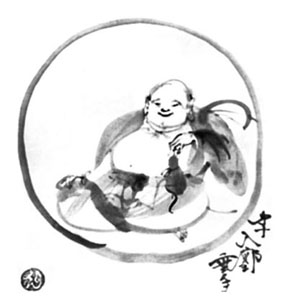
Stage 10
ENTERING THE MARKETPLACE
WITH ARMS HANGING LOOSE

Introduction
He closes the thatched gate to his hermitage so that even the thousand sages do not know of him.
He buries the light of his own knowing and goes against the tracks left by former sages.
Carrying a gourd, he enters the marketplace; holding his staff, he returns home,
Bestowing Buddhahood on barkeeps and fishmongers.
He buries the light of his own knowing and goes against the tracks left by former sages.
Carrying a gourd, he enters the marketplace; holding his staff, he returns home,
Bestowing Buddhahood on barkeeps and fishmongers.
Verse
Shoeless and bare-chested he enters the marketplace;
He is daubed with earth and ashes, and a smile fills his face.
Making no use of the secrets of gods and wizards,
He causes withered trees to bloom.
He is daubed with earth and ashes, and a smile fills his face.
Making no use of the secrets of gods and wizards,
He causes withered trees to bloom.
We have finally reached in our study the tenth of the Ten Ox-herding Pictures, "Entering the Marketplace with Arms Hanging Loose." A person is going into a market with hands swinging loosely by his side, that is, as casually as you can be. From the first stage, "Seeking the Ox," through the ninth stage, "Returning to the Source," by practicing extremely hard, you have cleared the head of all concepts such as Buddhist Way, enlightenment, certificate of approval [inka sh�mei] and so on. They have all been completely swept clean. And, of course, it goes without saying, that any remnants of the dualistic concepts opposing self to other are completely gone. The depths of a person at this stage cannot be fathomed or seen into by even Shakyamuni himself.
And the person who has reached this level does not show any outward signs of being in such a high or deep or tranquil stage of being. Nor does he or she make any conscious effort to keep the rules of conduct and teachings of the saints and wise people of old. You simply go where you want, do what you want, and live as you like. And yet you do not stray from the right path. You lead a life of total freedom, a life of natural simplicity without striving to do anything - and yet there arise no problems.
As an example of that total freedom in all its naturalness in daily life, there is offered the picture of a fellow swaggering to the market while chatting and swinging a canister of sake at his hip and sharing it with others. By the time he heads for home he will be completely drunk and tottering on his legs. But even so he naturally makes his influence felt on the guests and owners of the bars and fish shops, and convinces all that they are completely saved as they are. Such a power of influencing people for the good is a virtue naturally acquired in such a person. The substance of enlightenment has been totally personalized with no untoward effects remaining. In other words, the person has completely matured in buddha-hood.
Now let's savor Master Kakuan's final verse:
Shoeless and bare-chested he enters the marketplace.
With chest bared, he saunters along barefoot without shoes, and enters the marketplace. Without giving any thought to what others may be thinking of him, he opens himself completely with no premeditation and acts and talks to them spontaneously. All pictures representing the tenth of the Ten Ox-herding Pictures show a fellow named Hotei [ ?-917, Zen monk in old China]. He is said to have had a big belly. His gut is big and his chest bare. He has a big bag and a staff. And perhaps he has been walking barefooted. The attitude of the dear old Hotei, who is said to be a manifestation of Bodhisattva Maitreya, was presumably as that depicted by this verse. The purpose of your practice is this, and insofar as there still remains even a little remnant of the smell of enlightenment, you are still imperfect and immature and foolish, and it is necessary to add even more practice and discipline.
He is daubed with earth and ashes, and a smile fills his face.
Only after you become such a personality, for the first time you suffer with a suffering person [kait�-domen: ash-covered head and earth soiled face] and ever so naturally a power to save that person emerges. This is not by any conscious effort of will to do so, but it appears as something you must do as a manifestation of the spirit of compassion. This is what is meant by the term "compassion arising out of the body even without Dharma-bonds" [muen-d�tai no jihi]. As Shakyamuni is reputed to have said: "All lands are my land; and all the living beings in those lands are my children." When you achieve this state you help people realize their own Buddha-hood daily and naturally in every place and at every time. Because such a person is at all times peaceful and calm at heart, there is always a smile playing on his or her face even when not laughing, and the lips are always smiling. This is the meaning of the phrase, tenka-taihei (all is peaceful under the sun).
Making no use of the secrets of gods and wizards.
To reach such a state and live in such a way there is no need to have supernatural powers of a holy hermit. That is the meaning of the third line of the verse. In days of old many of those who did Zazen practice earnestly were able to achieve such mental power of concentration that they could have many kinds of supernatural powers. Shakyamuni himself in his Dharma-combats with his non-Buddhist opponents made use of such powers. But these are, in the final analysis, byproducts of zazen, and not the purpose of the practice of the Buddhist Way. And even should you achieve them it is certainly not a thing of great importance.
Accordingly in the Ten Ox-herding Pictures, far from emphasizing such powers, it is proclaimed quite clearly here that they are not necessary at all.
He causes withered trees to bloom.
The achievement of this state is that you can help even those who, like a withered tree, have lost all mental zest come to "blossom" again with a new breath of life. The vow expressed in the words: "Living beings are numberless, I vow to save them" is truly the prayer of all buddhas and bodhisattvas and is none other than the font of the practice of the Buddhist Way. And the fact that this capacity is already perfect in all men and women and all have it, is what Shakyamuni preached, lived, and passed on.








